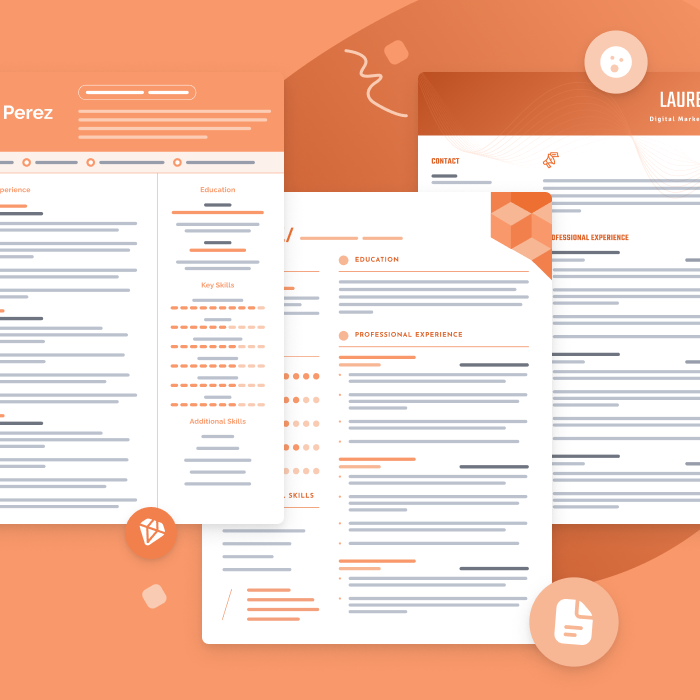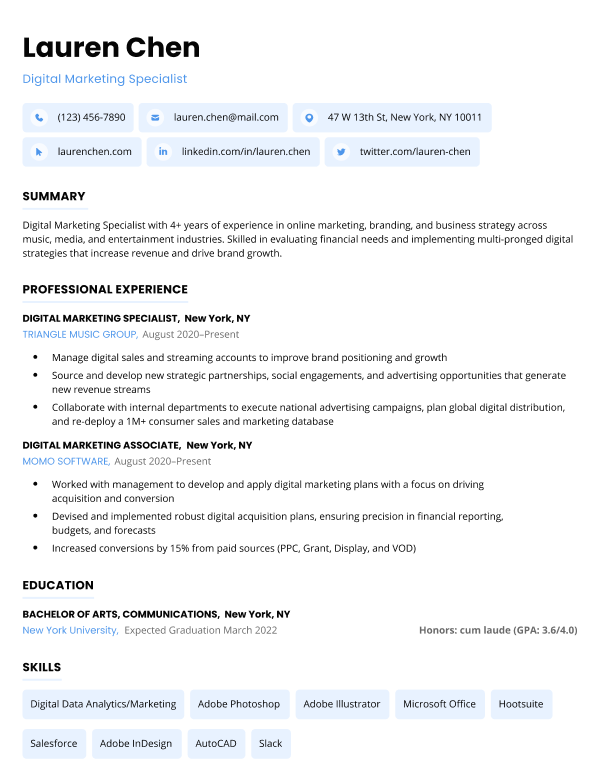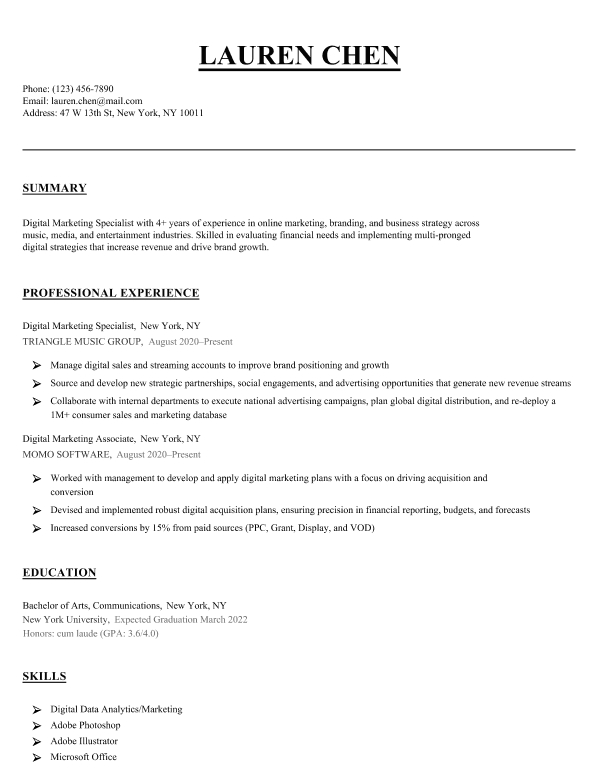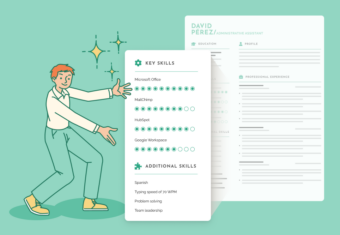Although there are many types of sales jobs, certain skills are universal and necessary to thrive in the highly-competitive sales industry.
These sales skills can range from hard to soft skills, and even include natural personality traits. To impress employers, you’ll need to include at least some of these on your resume.
Here are the top 12 sales skills with examples to show you how to include these top resume skills.
Our free-to-use resume builder can make you a resume in as little as 5 minutes. Just pick the template you want, and our software will format everything for you.
Hard sales skills
Hard sales skills are the technical skills needed to survive and thrive in the sales industry. These skills can’t be learned without work experience or classroom and on-the-job training.
Here’s a list of seven hard skills to add when writing a resume for a sales role:
Contract negotiation
Selling, especially in large quantities, often involves signing lengthy contracts with businesses or senior employees, such as C-level executives. Everything from quantity and volume to pricing and contract length within these agreements is up for discussion.
Your client will be prepared to discuss the terms and will be looking to get the best deal possible for their business. You’ll need great negotiation skills to navigate their demands and give in-depth explanations if you cannot meet their requirements.
Sales software
Having computer skills is essential to being a great salesperson because you’ll need to be proficient with the various software programs commonly used in your industry.
Nearly every sales department uses software to conduct business by managing their records and clients, tracking leads and conversions, and communicating with customers.
However, you don’t want to simply list “computer skills” or “software skills” on your sales resume because it isn’t clear enough to the hiring manager.
Instead, list the specific software you’re proficient in, and show your willingness to learn new programs when writing your sales cover letter or while being interviewed.
Here’s an example of how to list your sales software skills on your resume:
Product knowledge
You can’t convince people to buy your company’s product if you don’t know its competitive advantage or how it differentiates itself from the rest of the market. To be a good salesperson, you need to know everything about your product to create a great sales pitch to the customer.
You technically shouldn’t list “product knowledge” as a skill in your resume skills section, but you can find ways to demonstrate it throughout your resume, and certainly in an interview.
Here’s an example of how to flex your product knowledge as a skill in your work experience section:

Prospecting & discovery
Every customer you’ve ever signed a contract with at some point started as a new prospect for your company.
Closing deals and signing contracts are great, but having good quality leads and finding new clients are equally important if you want to stay competitive and have a steady influx of sales revenue for your company.
Employers looking for a salesperson will be looking for their ability to prospect and discover new sales leads and clients. If you’re proficient at it, ensure you include prospecting and discovery as skills on your resume.
Sales presentations
Sales presentations are one of your most important tools available when establishing a relationship with new clients. A well-executed sales presentation can not only help build a connection with your customer but also help distinguish your business from competitors.
To properly pitch a product using a sales presentation, you’ll need excellent presenting skills, including good communication, confidence, and public speaking.
You’ll also need to be proficient at using PowerPoint to make easy-to-digest graphs and numbers for your clients to read. While it’s not a game-breaker, if you’re struggling to find sales skills to list, listing you’re proficient with Microsoft PowerPoint is a worthwhile choice.
Customer service
When dealing with clients, especially in the prospecting and discovery stage, you’ll need to be available (sometimes 24/7) to address their needs, issues, and concerns regarding the contract and the product or service that you’re selling.
During your career as a salesperson, you’ll also have some customers and clients that will frustrate you at some point. But, as in many industries, in your company’s eyes, the customer is always right (even if they’re wrong).
For these reasons, to properly manage and handle your clients, you’ll need excellent customer service skills.
Here’s an example of how to include your customer service skills on your resume:
- Personally added 20+ long-term clients within a 2 year period. Ensured swift and prompt communication, and conducted a formal survey after each delivery to measure success and customer satisfaction
Client management
Managing your company’s relationships with clients and customers is essential if you want to keep their business. As such, many employers will require sales candidates to show evidence of their client management skills on their resume.
Successfully managing clients means:
- Building trust (this is likely done after several successful sales, but early on, you could build trust with a client by simply sharing company or industry jargon, or taking the time to actively listen to them).
- Being realistic. Don’t promise the client or customer anything you’re not 100% sure you can deliver. Instead, tell them you’ll check and be in touch with an answer.
- Researching and learning about your client’s industry. They’ll appreciate that you took the time and it will likely help build a relationship with them.
- Measuring success. You can measure success through formal satisfaction surveys. This will give you a good idea of your key performance indicators and where your organization needs improvement.

The best resume templates for 2024
One of the best ways to make your resume is by filling out one of our free resume templates. All our templates are designed by experts and free to download for Microsoft Word or Google Docs.
Soft sales skills
Now that we’ve gone over some of the hard skills needed to succeed in sales, reviewing the soft skills you’ll need to be a successful salesperson is equally important.
Soft skills include a variety of things, such as personality traits and interpersonal skills, and are sought-after by hiring managers because they often can’t be taught in a classroom setting. You’ll either have them, or you won’t.
Below we’ve included five great soft skills for sales that any hiring manager love to see displayed on your resume.
Communication
Communication skills are necessary for nearly everything a sales associate does. From the very beginning of prospecting and discovering clients, all the way to negotiating contracts, you’ll need good communication skills to be able to sell to customers.
You could be the most knowledgeable salesperson in the world. However, if customers feel they can’t comfortably or effectively communicate with you, they’ll be less likely to buy your products or services.
Here’s an example of six communication skills to list on your resume:
- Oral and written communication
- Active listening
- Public speaking
- Presentation skills
- Phone etiquette
- Digital communication (emails, social media, LinkedIn, etc.)
Additionally, non-verbal communication, such as body language and confidence, is important, but it’s not something you’ll typically list in your skills section. Here’s an example of how to display good non-verbal communication skills in your work experience:

Time management
Effective time management skills are vital for salespersons because you’ll have more flexibility with your work schedule, and your superiors won’t actively manage you.
Instead, you’ll be expected to produce results without consistent oversight. Usually, managers view sales outcomes as more important than the sales process itself. They’ll want to see high sales volumes from you but will often give you the freedom to decide how to approach and meet the company’s sales goals.
Hiring managers want to know their sales team can prioritize tasks, avoid distractions, and pursue leads rather than procrastinate or get drawn into less critical work.
Emphasize your time management skills to show that you can handle the job by meeting sales targets without needing daily oversight from a manager.
Interpersonal skills
Whether it’s meeting face-to-face, over the internet, or on the phone with clients, sales jobs require a lot of daily human interaction. You’ll need great interpersonal skills to handle all the interactions required to close deals with clients and customers.
Interpersonal skills are typically personality traits, such as being confident and having empathy. They can’t be taught and are instead developed naturally over time.
For this reason, a sales manager will see interpersonal skills as valuable tools when paired with professional experience.
Traits such as the persistence to keep going and not take rejections personally (which you’ll likely receive a lot of) are valued in the sales industry, as is having confidence when doing sales pitches.
Here’s a list of nine great interpersonal skills for a salesperson:
- Confidence
- Empathy
- Reliability
- Emotional intelligence
- Persistence
- Patience
- Consistency
- Diplomacy
- Conflict resolution
Adaptability
Deadlines, targets, and goals will always change in the sales industry, and you’ll need to adjust your sales tactics and processes to meet any (sometimes last-minute) alterations.
As a sales professional, you’ll need great adaptability to roll with the punches and take on new day-to-day challenges as they come your way.
Problem-solving
Suddenly your supplier tells you they can’t deliver a product at a particular price point because of a supply chain problem or an increase in production costs after you’ve already agreed upon a price with your client.
The last thing you want is your client to refuse to sign a contract with your business, and your manager will expect you to fix this issue (even though it’s technically not a fault of your own). So, you’ve got to be able to solve the problem before it reaches upper management.
Last-minute issues can arise in any industry, especially sales, where there are a ton of parameters involved in signing a single deal or contract. You’ll need to be equipped with great problem solving skills to develop strategies to cope with issues that arise on the job.
Here’s an example of how to display your problem-solving skills on your resume:
- Acquired 5 new 10-year contracts from existing clients by addressing long-term issues, such as delivery delays, last-minute price fluctuations, and communication issues
More skills for your sales resume
Here are other skills hiring managers look for on sales resumes.
Click to rate this article
4.7 Average rating


















